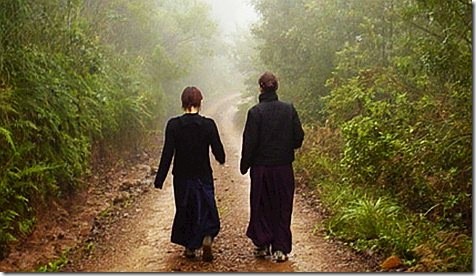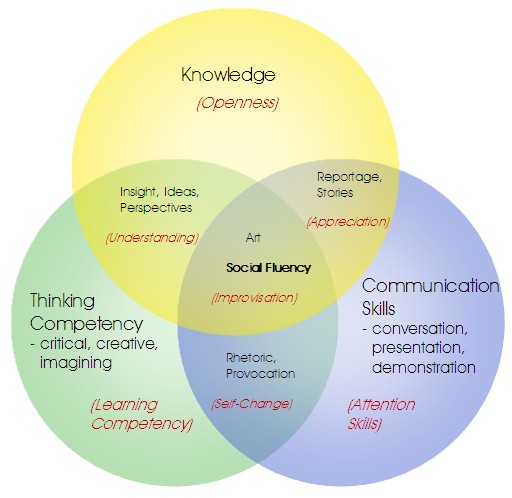
photo by Maren Yumi
A couple of years ago, riffing off Nancy White, I wrote that
Life’s meaning, and an understanding of what needs to be done, emerges, most often, from conversation in community with people you love. It is the key to changing anything, whether it be the political or economic system, or yourself, or whether you want to save the whales, stop global warming, reform education, spark innovation or change anything else.
Now (thanks to Tree and my colleagues at Art of Hosting for the link) a new study suggests that when we have deep, meaningful conversations with others, we are happier people. The authors of the study say the result was counter-intuitive (“don’t worry, be happy” and “I don’t want to know”) but it really doesn’t surprise me. We are programmed to look for explanations and solutions for things we don’t understand and don’t like. Initially we may want to try to control the situation, rush to conclusions and solutions, but when those prove elusive, and the knowledge, ideas, perspectives and insights we have acquired don’t help us cope, we quickly turn to conversation. Why? I think there are ten reasons that conversations are so valuable they drive almost everything we believe, understand, and do:
- It’s better to know. Maybe we say and feel that we don’t want to know how bad it is, but when we say that we’re already imagining the worst. The truth is usually not that bad, and that truth often emerges from conversation.
- We like reassurance that what we feel and think makes sense. The fastest way to get that reassurance is to converse, to share, because from conversation come the nods of understanding, the appreciation, the sympathetic ideas, and the empathy that make what we feel and think more bearable, more sensible.
- It’s how we learn. We learn best by doing, by watching others, and by asking questions, and all three processes are improved through intelligent conversation. Tell me, how/why did you do that? Show me again and this time talk me through it. Now let me try, and tell me how I’m doing at each step.
- It’s how we decide. The best decisions are informed by ‘the wisdom of crowds’, by consultation, by talking through the options, by consensus.
- It’s how we resolve conflict. Conversation is how we ‘talk out’ our differences. When we discuss our respective viewpoints respectfully and openly, an appreciation of the other person’s feelings, beliefs and rationale can emerge, and the misunderstanding that usually underlies the conflict can be dissipated.
- It leads to intention, and hence to action. Often an event or learning will lead us to a sense of urgency to act, but not give us wisdom of what action to take. Conversation, once it has reassured us that our instinct to act is valid, can help us surface and learn some of the options to act, and hence propel us into action. And when we converse, we often state our commitment, our intention to act, and having a witness to that intention can also push us to act on it.
- It clarifies, in our own minds, what we care about and hence who we are. What we care about defines who we are, so when we have a conversation that helps us understand whether and to what degree we care about an issue, and why, we come to understand and know ourselves better. That makes us more useful in many ways, and in the process, probably makes us happier.
- With practice, it improves our social fluency, and other critical capacities and competencies. The chart below is one I co-developed with Chris Lott, and the blue circle which, in concert with our knowledge and thinking competencies enables us to be usefully expressive (artistic and improvisational, and hence socially fluent) is all about the capacity for and practice of conversation.
- With practice, it teaches us the critical appreciative skills of listening and attention. Every conversation is a dance, and you have to be pretty insensitive not to realize that if you always lead and dominate the conversation, soon people won’t want to dance with you any more. And of course we learn more when we pay attention, really listen to what others are saying.
- It opens us to new possibilities. Although often in conversation we are seeking reassurance, attention and appreciation, sometimes we will be surprised, bowled over, astonished, to hear something, or to realize something, that changes us radically, opens us to new ideas and worldviews, breaks our heart. That is the key to innovation and resilience, and good conversation can expose us and keep us open to these mind-altering, heart-breaking new possibilities.

model based on the social fluency model by Chris Lott, described in this earlier post
Yes, I know, lately I’ve been down on language because while it’s a passable tool for intellectual understanding it’s a poor one for communicating emotion. But I’m not sure you even need language to have a deep and meaningful conversation. Watch lovers converse with the ‘illiterate’ sounds and tones of their voices, watch the body language in meetings and casual encounters, watch wild animals collaborate on a project they couldn’t do alone — each is a wordless conversation. Even the conversation we have with ourselves (and imagine ourselves having with the author) when we read something stimulating is a substantially illiterate conversation — it’s more about acknowledging what we feel, and tapping into our instincts, than it is an intellectual word-conversation.
These ten ‘values’ of conversation make us more competent, more human, more appreciative, more collaborative.
No wonder conversation makes us happy.





Pingback: The Value of Conversation « how to save the world Mobile
Pingback: uberVU - social comments
Pingback: Tweets that mention The Value of Conversation « how to save the world -- Topsy.com
Hey!
Wow… I saw that study and had an immediate positive reaction to it. I *know* we are happier when we have *real* conversation. But Dave, the way you broke it down is brilliant. So often I only stop and analyze when I do not intuitively agree… but this is really valuable for others that may not be so certain. And you hit it on the head all the way thru. Good stuff!
Janene
I am a great proponent of the power of conversation. In actual fact, I believe conversation has a power of re-creation and restoration which has been partly scientifically acknowledge by psychology: every psychotherapy involves discussing issues with a third party.
Also, there is an element of pure creation which comes from discussion: brainstorming is an example, but also in some societies, rhetoric discussion is a way to understand wisdom and come to newer understanding.
Fascinating subject, which I do not fully understand I realise…
Dave, report ASAP to the nearest advanced neuro-cognitive lab for the downloading and replication of your mind. This is really good stuff.
While I am first a proponent of face-to-face conversation for many of the same reasons you describe — there is an unknown element of embodiment that is powerful and only just now being teased out of the cognitive sciences, somatic psychology and the like — I believe this is also fuel and fodder for the use of Skype, podcasting and similar tools for the connections among world-wide networks of alignment.
Three additional morsels:
Andrew Lippmann, Ph.D., Associate Professor of Media Technology associated with MIT’s Media Lab, said in 1986 that “Interaction involves mutual and simultaneous activity among people working on a common goal. The process must be mutually interruptible (like a “conversation”) and therefore where you end up is an unknown.”
Lawrence Halprin, the landscape architect who gave us the RSVP cycle of seed (resources), score (theme), value/feedback, and performance, says that through “the process of cyclical involvement with people, you can generate creativity, which is what really counts. Without a sense of participation, there cannot be any group creativity….. Whenever communications are discussed, there is always a lot of talk about common language. If you put people in positions in which they share an experience — experience on a deep level — that in itself is the most powerful form of common language I can possibly imagine.”
Anne Branscomb, in “Finding One’s Way in a Multimedia Society”, tells us that it is not the technologies we’d use but the human brain power and the human values, brought through stages of entry, exploration, integration, commitment and fulfillment by a computer-aided but human-centered process, that enables answers to emerge.
Yes!! I too saw this article and found it fascinating!! And I admit, hopeful, that enough people would read it, hopefully take a new approach toward life and begin to create positive change. I think meaningful conversations is the way to go and perhaps should be written into a proposal for saving the world. You’ve got some great ideas!!
– Sue R.
many people said that body language is more meaningful than words…
nice info.. thank you..